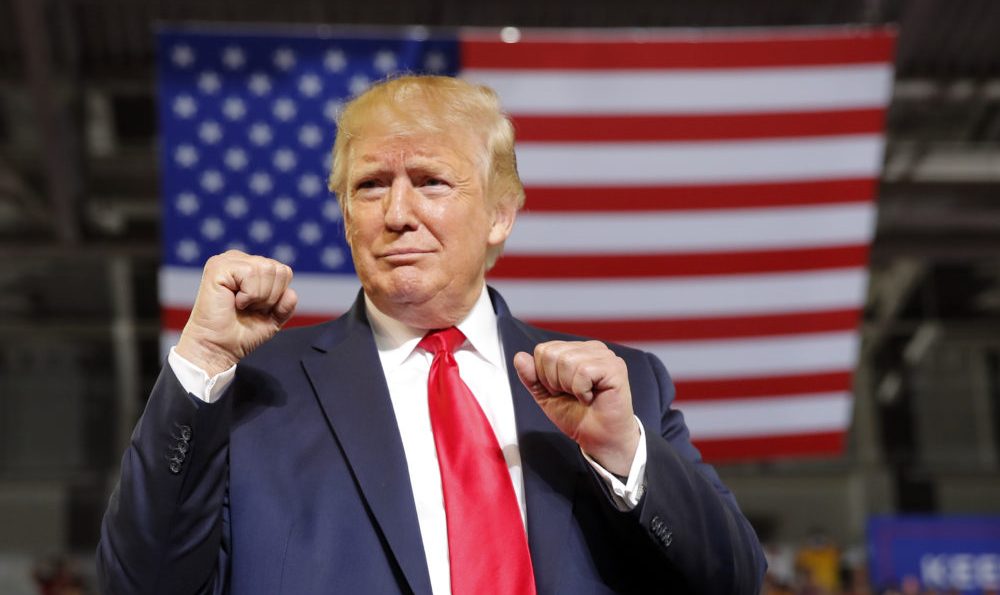Trump Pledges Crypto Leadership for the U.S. Amid Bitcoin’s $100K Surge
12.12.2024 17:54 1 min. read Kosta Gushterov
During a recent appearance at the New York Stock Exchange, President-elect Donald Trump expressed his ambition for the United States to take the lead in the global cryptocurrency space during his upcoming term.
His remarks signal a potential shift in the nation’s approach to digital assets.
Speaking with CNBC’s Jim Cramer, Trump emphasized the need for America to stay ahead in the cryptocurrency race, referencing competition from nations like China. He hinted at exploring strategies to strengthen the U.S.’s position, including the possibility of creating a national Bitcoin reserve. “We want to be at the forefront, not playing catch-up,” he said.
BREAKING: 🇺🇸 President-elect Donald Trump says, “Will be doing something great with crypto.”
pic.twitter.com/47TFh8j7NM— Bitcoin Magazine (@BitcoinMagazine) December 12, 2024
This marks a significant departure from the policies of the outgoing administration, which often clashed with the cryptocurrency sector. Trump’s comments align with promises made during his campaign to support the burgeoning digital asset industry, a move that resonated with voters and industry leaders alike.
The visit to the NYSE, where Trump rang the opening bell in celebration of his recent recognition as Time magazine’s “Person of the Year,” coincided with Bitcoin maintaining its historic position above the $100,000 mark—a milestone it reached last week, capturing global attention.
-
1
SoFi Returns to Crypto with Trading, Staking, and Blockchain Transfers
27.06.2025 8:00 1 min. read -
2
GENIUS Act Could Reshape Legal Battle over TerraUSD and LUNA Tokens
30.06.2025 9:00 1 min. read -
3
Whales Buy the Dip as Retail Panics: This Week in Crypto
29.06.2025 14:00 3 min. read -
4
History Shows War Panic Selling Hurts Crypto Traders
28.06.2025 18:30 3 min. read -
5
Ripple Faces Legal Setback as Court Rejects Bid to Ease Penalties
26.06.2025 16:54 1 min. read
Citigroup Explores Launching Stablecoin as Banks Embrace Crypto Shift
Citigroup is evaluating the potential launch of its own U.S. dollar-backed stablecoin, signaling a growing shift in sentiment among traditional financial institutions toward digital assets.
JPMorgan CEO Jamie Dimon Comments Stablecoins
JPMorgan Chase CEO Jamie Dimon remains skeptical of stablecoins—but says ignoring them isn’t an option for the world’s most powerful bank.
Crypto Cycles are Evolving: Analyst Explains Why Old Patterns no Longer Work
According to crypto analyst Atlas, the traditional four-year cycle that once defined Bitcoin and altcoin market behavior is now obsolete.
Kraken Launches U.S. Crypto Derivatives Platform, Eyes Broader Market Expansion
Kraken has officially launched its U.S.-regulated crypto derivatives platform, marking a major step toward merging traditional finance tools with digital asset markets.
-
1
SoFi Returns to Crypto with Trading, Staking, and Blockchain Transfers
27.06.2025 8:00 1 min. read -
2
GENIUS Act Could Reshape Legal Battle over TerraUSD and LUNA Tokens
30.06.2025 9:00 1 min. read -
3
Whales Buy the Dip as Retail Panics: This Week in Crypto
29.06.2025 14:00 3 min. read -
4
History Shows War Panic Selling Hurts Crypto Traders
28.06.2025 18:30 3 min. read -
5
Ripple Faces Legal Setback as Court Rejects Bid to Ease Penalties
26.06.2025 16:54 1 min. read

